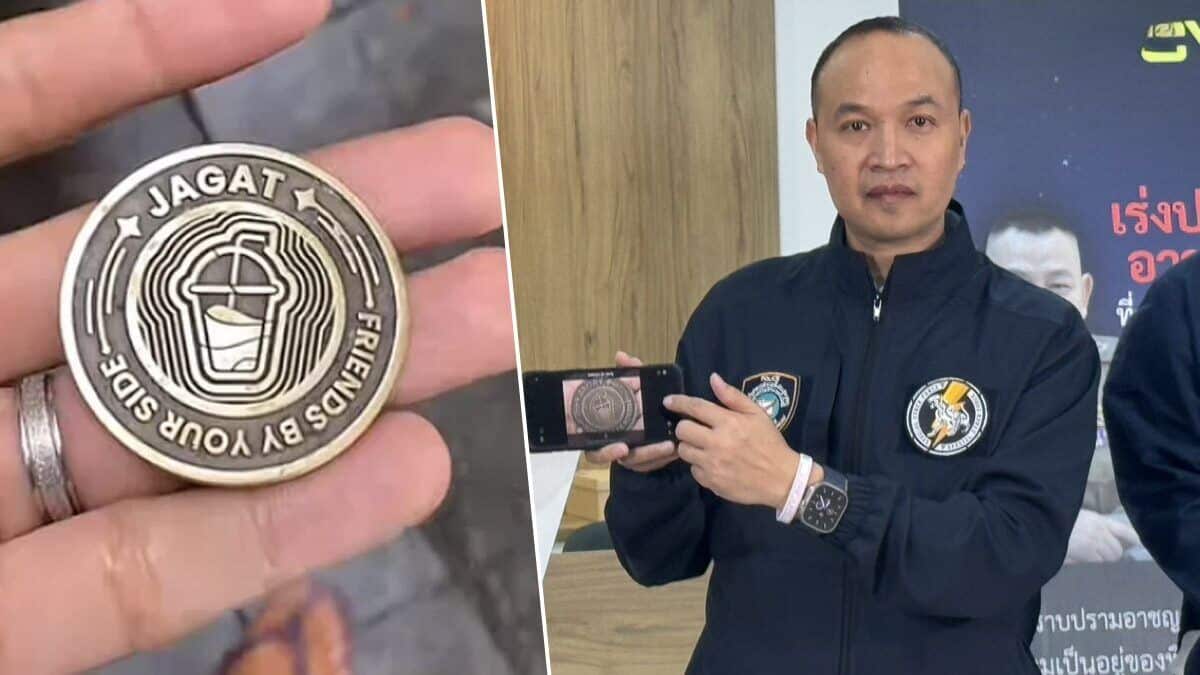Cyber Crime Division probes legality of Jagat coin app

Thailand’s Cyber Crime Division has identified the Jagat coin as potentially illegal, uncovering three bank accounts linked to player transactions, and has summoned account holders for questioning. Players are warned of possible legal repercussions.
Police Lieutenant General Trirong Phiewpan, commander of the Cyber Crime Division, yesterday highlighted concerns about the Jagat coin hunt app. Initial investigations suggest it may involve illegal gambling, as the app provides rewards through chance without proper authorisation. The cyber police plan to verify with the Ministry of Interior whether the app’s owner sought permission for such activities. If no permission is obtained, legal action will be pursued.
Financial tracing revealed that prize money from the app was transferred through three bank accounts belonging to Thai nationals in northern Thailand, a region where the coin hunt activities took place. However, these accounts have not been linked to call centre scams or other cyber crimes.
Police will summon the account holders for questioning to determine any connections with the app’s owner. Meanwhile, the individuals responsible for placing coins at various locations remain unidentified, and investigations are ongoing.
The app has raised privacy concerns due to its access to users’ mobile data, including personal information and continuous GPS tracking. As the app’s database is overseas, data security remains uncertain, posing potential risks of personal data leaks.
The nature of the coin hunt activities could also expose players to criminal charges, such as trespassing or property damage when searching for coins on private property. Additionally, players may incur costs to simplify their search. The public is advised to educate and caution children about the app’s potential risks, reported KhaoSod.
UPDATE: Teasure-hunting game Jagat sparks public disturbance in Thailand
Patrol and Special Operations Division police are monitoring players of the treasure-hunting game, Jagat, after reports of community disturbances caused by players searching for virtual coins to earn real-life cash.
Jagat is gaining popularity, particularly in Thailand and Indonesia. The game was developed by Jagat Tech, founded by Barry Beagen and Loy Xing Zhe.
The game operates on a model similar to Pokémon Go, but this game encourages players to search for virtual coins hidden in various locations, which can then be exchanged for real money. Jagat game attracted over 10 million users across the world and recently gained significant traction among Thai players.
In Thailand, virtual coins are reportedly hidden in Bangkok, Pattaya, Phuket, Chiang Mai, and Chiang Rai. Players must follow the map provided in the game’s app to locate the coins and claim rewards.
The value of the coins ranges from 500 to 200,000 baht, depending on the difficulty of finding them. After locating a coin, players must input their codes into the game app to receive the money reward, which is transferred directly to their accounts.
To assist in finding particularly elusive coins, players can purchase in-game items that provide clues about their locations.
These coins are often hidden in unusual or challenging spots, such as behind drainage lids, in narrow spaces between buildings, or even on private property. This has occasionally led players to trespass on private property in their quest for coins.
According to a report by Beartai, some players in Indonesia damaged public infrastructure, such as footpaths, in their attempts to retrieve the coins.
Similar issues have arisen in Thailand, where residents filed numerous complaints with police about strangers entering their homes without permission and causing disturbances, particularly at night.
In response, Patrol and Special Operations Division police have issued warnings to Jagat players, urging them to avoid disruptive behaviour. Offenders could face the following charges:
- Section 362 of the Criminal Law: Trespassing and disturbing another person’s property, punishable by imprisonment of up to one year, a fine of up to 20,000 baht, or both.
- Sections 362 and 356 of the Criminal Law: Trespassing and disturbing another person’s property at night, punishable by imprisonment of up to five years, a fine of up to 100,000 baht, or both.
- Section 358 of the Criminal Law: Damaging another person’s property, punishable by imprisonment of six months to 10 years and a fine ranging from 10,000 to 200,000 baht.
- Section 392 of the Criminal Law: Causing another person to feel fear or shock through threats, punishable by imprisonment of up to one month, a fine of up to 10,000 baht, or both.
Aside from community disruptions, concerns have also been raised regarding player safety. The game requires players to share their real-time location with online friends while playing and collect personal and e-payment account information.
Authorities have urged players to exercise caution and respect the rights of others while participating in the game.
ORIGINAL STORY: Treasure game chaos: Chiang Mai teens warned to stay out
Chiang Mai police issued a stern warning to teenagers playing the Jagat Coin treasure-hunting game after reports of property damage and safety risks surfaced. The popular app, developed in Indonesia, has caused disturbances in the northern province, prompting law enforcement to caution players against trespassing on private property.
The warning was posted on the Chiang Mai Police Facebook page after teens were caught entering a private residence on Soi 9, Mool Muang Road, in Sriphum subdistrict, Mueang district.
According to Chiang Mai News, the treasure hunters caused significant damage, trampling plants, digging up soil, climbing fences, and breaking into a locked fire extinguisher cabinet. A police red checkpoint box was also vandalised in their quest for the game’s virtual coins.
The game, launched in Thailand on January 15, involves players using an app to hunt for Jagat coins in public locations. These virtual treasures can be redeemed for substantial cash prizes: gold coins for 200,000 baht, silver coins for 20,000 baht, and bronze coins for 500 to 2,000 baht each. However, the chaos led Jing Jai Market, a local project, to ban players from its premises and distance itself from the game.
Police emphasised that the app lacks Thai partners, complicating efforts to address issues with its developers. They also warned users about hidden subscription fees within the app and the dangers of sharing their location, which could make them targets for robbery or other crimes, reported The Nation.
“Players must understand the risks and legal implications. This is not just a harmless game—it can lead to real-world consequences.”
The gaming industry contributes significantly to Thailand’s economy, supported by local developers and foreign investments. Games offering real-world rewards, such as Jagat Coin, are appealing to users seeking financial incentives.
Concerns over data privacy, subscription scams, and the misuse of location-sharing features expose players to potential crimes like fraud and robbery.
Latest Thailand News
Follow The Thaiger on Google News:


























